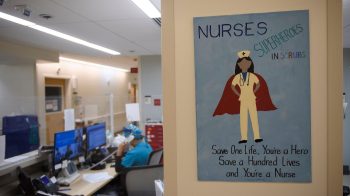Bridging the gap between nurses and IT
Steve Chiotakis: As we await today’s big April employment report from the Labor Department, medical jobs are still growing by leaps and bounds, including the position of Nursing Informaticist.
From the Marketplace health desk at WHYY in Philadelphia, Gregory Warner reports even though most of us don’t know what that is, the job’s in pretty big demand.
Gregory Warner: Don’t tell her boss, but Diane Humbrecht gets a lot of recruitment calls.
Diane Humbrecht: Several every week.
Warner: Trying to pull you away from this hospital?
Humbrecht: That’s right! But I love it here.
“Here” is Abington Memorial Hospital, where Diane is director of nursing informatics. She helps clinicians talk to the IT staff and vice versa.
Humbrecht: So we help translate. I always think of us as a translator.
Between nurse speak and geek speak. For example, when the quick stroke of a pen is replaced by a series of mouse clicks, to type in the same information over and over on multiple screens, nurses will complain to IT.
Humbrecht: And IT will be like, “Why?” But if it comes through us, we can explain it in a different way — in their language.
And get IT to make the system easier before nurses revolt.
And revolt, they have. Not at Abington, but at other hospitals.
Joann Spetz: There are a lot of nurses who did not grow up with computers.
Joann Spetz is an economics professor in the School of Nursing at the University of California, San Francisco. She says that hospitals are spending billions of dollars to go electronic before a federal deadline of 2015.
Spetz: You know when these systems work, they can be great for patient care. But when they don’t work, either because there’s a flaw in the system, or because there’s a problem with the implementation and the buy-in, it can basically be wasted money. And even worse, we’ve seen cases of patients getting harmed.
So hospitals are desperate to hire informaticists — or technology therapists — like Diane.
Humbrecht: You gotta go and sit with the staff. Tell them it’s OK. Show them, look you can do this, and then they’re just thrilled.
Nursing informaticists earn an average $99,000 a year — up from $70,000 in 2004. For Diane, there’s a greater mission to getting nurses to go electronic.
Humbrecht: Because as nurses, we really haven’t been able to tell the world really what we do. It’s all anecdotal. But now, I actually have documentation and data to quantify what a nurse does every hour of the day.
So hospitals can learn from the best nurses. And as a nurse herself, Diane is happy to help her profession. As a techie, she knows that nothing’s real until it’s digitized.
In Abington, Penn., I’m Gregory Warner for Marketplace.
There’s a lot happening in the world. Through it all, Marketplace is here for you.
You rely on Marketplace to break down the world’s events and tell you how it affects you in a fact-based, approachable way. We rely on your financial support to keep making that possible.
Your donation today powers the independent journalism that you rely on. For just $5/month, you can help sustain Marketplace so we can keep reporting on the things that matter to you.


















